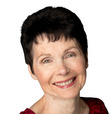Robin Storey's Blog, page 9
July 20, 2015
My Good Read Recommendations
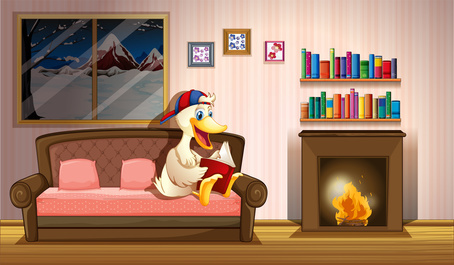
Nothing like a quacking good read!
Here in Australia we’re in the middle of winter and over the last few days many areas have experienced particularly cold snaps. On Queensland’s Sunshine Coast where I live, we shiver and rug up if it gets below 18 degrees Centigrade. (64 degrees Farenheit).
Regardless of where you live, there’s nothing more comforting in winter than snuggling up on the couch under a blanket in front of a roaring fire with a hot chocolate and a can’t-put-it-down book. (I don’t have a fireplace but I can dream!)
Writers are by definition avid readers – that’s how we learn our craft. As Steven King says, if you want to be a writer, you must do two things above all others – read a lot and write a lot. For me and I guess most readers, a book is a chance to immerse myself in another world. Escapism is a common term used to describe it but for me it’s more than that, because I often learn things about myself and the world – from fiction as well as non-fiction. And books serve different functions – some are light and funny, pure entertainment, while others make you think, their themes and characters resonating with you and staying with you long after you finish the book.
Author and blogger Joanna Penn has written an interesting and comprehensive blog on her reading habits called Reading Habits of a Digital Junkie. She says that she rarely reads print books and no longer buys them, reading almost exclusively on her Kindle, on which she has over 1000 books stored.
I must confess to a foot in both camps here – I like both print and e-books. I love my Kindle because it’s very portable and I always take it travelling with me. I love the immediacy of the buying process – I see a book on Amazon I want to read, one click and it’s on my Kindle. (Which can also be a trap for compulsive book buyers).
But there’s something about a print book that I can’t let go of. It’s the sensory experience – the colour and design of the cover, the crisp new pages holding the promise of the journey within them and their fresh, newly minted aroma. Yes, I have to fess up: I’m a book sniffer. It's essential for me to have a whiff of the pages before I dive in, to the amusement of my partner. It doesn’t matter if the book is new, second hand or borrowed from the library. (I know I’m not alone in this - come on, I know you’re out there!) I’ve written about my affliction on my previous blog.
I like reading the recommendations of other readers (Goodreads is a great site to post your own reviews and read other peoples’) and that’s often how I find books that interest me. So if you’re looking for a good book to cuddle up to, here are 10 of my favourites. I’ve tried to include as wide a variety as I can, but you won’t find any category romance, spec fiction or fantasy, as they’re not my cup of tea.
I've included a link to each book's site on Amazon, if you'd like to purchase it.
Suspense/thriller: The Kind Worth Killing by Peter Swanson
On a night flight from London to Boston, Ted Severson meets the mysterious Lily Kintner. Sharing one too many martinis, the strangers begin to play a game of truth, revealing intimate details about themselves. When Ted reveals he’d like to kill his wife Miranda, Lily offers to help. Their bond grows stronger as they plot Miranda's demise, but soon these co-conspirators are embroiled in a game of cat-and-mouse with a shrewd and very determined detective on their tail.
This book had me reading into the early hours of the morning. The plot, characters and narrative tension are excellently executed. It’s not your typical psychological thriller and the author breaks quite a few writing “rules” (which I can’t mention without including spoilers) but he pulls it off well. Due to the multiple viewpoint structure, he manages to evoke empathy for some otherwise rather unlikable characters. I loved the ending – implied but totally satisfactory.
Buy here The Kind Worth Killing: A Novel
Historical Fiction: All That I Am by Anna Funder. Set in Germany leading up to the rise of Hitler, this is the story of eighteen-year-old Ruth Becker, who with her lover, journalist Hans Wesemann, eagerly joins in the heady activities of the militant political Left in Germany. Ten years later, when Hitler is elected chancellor of Germany, Ruth and Hans, together with her cousin Dora and her lover, become hunted outlaws overnight and are forced to flee to London. They dedicate themselves to a dangerous mission: to inform the British government of the very real Nazi threat to which it remains wilfully blind.
This was a brilliant debut novel which won one of Australia’s most prestigious literary awards, The Miles Franklin Award, in 2012. The whole story is told as a flashback by Ruth, now an old woman. It’s a story of courage, love and betrayal with thoroughly believable and sympathetic characters. The author had obviously meticulously researched that era of history right down to the tiniest details, as I was instantly transported to that time and place, and I really enjoyed learning so much about that era that I hadn’t known before. It’s written so well that it could so easily have been true, and it’s the kind of book that stays with you long after you’ve finished it
Buy here All That I Am: A Novel
Memoir: Boy Lost by Kristina Olsson
This is the true story of the author's mother Yvonne, whose baby Peter was literally snatched from her arms by her husband as she was escaping his abuse to start a new life. She doesn't see her son for another 36 years.
The memoir follows, along parallel tracks, the subsequent lives of Yvonne and Peter - how Yvonne re-marries and starts a new family, all the while repressing her grief, while Peter has a tragic childhood, yearning for his missing mother.
As is evident from the story, this book is about emotions - the whole gamut from guilt and grief to hope and love and everything in between. The author handles them beautifully, never becoming sentimental or mawkish, and she has a descriptive and lyrical style that's a delight to read. The parallel narrative of the lives of Yvonne and Peter works well and kept me engrossed. It's a poignant story that had me in tears when Yvonne and Peter finally reunite.
Buy here Boy, Lost
Fiction (Historical/Relationships): My Beautiful Enemy by Cory Taylor
Arthur Wheeler is haunted by his infatuation with a Japanese youth he encountered in the enemy alien camp where he worked as a guard during World War 2. Abandoning his wife and baby son, Arthur sets out on a doomed mission to rescue his lover from forced deportation back to Japan, a country in ruins.
This is a love story with a difference – a beautifully written novel about the relationship between Arthur and Stanley, from their youth to old age, and the love that is never able to be acknowledged due to circumstances and the attitudes of the times. The author's simple, understated language is evocative and at times emotionally wrenching. Arthur is the narrator of the story - he is a flawed character with some unlikable qualities, yet due to the author's skill in his portrayal I found myself empathizing with him and gunning for him to find happiness. A poignant story that left me moved at the end. Cory Taylor does forbidden love very well, as evidenced in her first novel, Me and Mr Booker.
Buy here My Beautiful Enemy
Non-Fiction: Quiet: The Power of Introverts in a World That Can’t Stop Talking by Susan Cain
At least one third of the people in the world are introverts. This book, impressively researched and filled with indelible stories of real people, shows how dramatically we undervalue introverts, and how much we lose in doing so. The author also introduces us to successful introverts and offers advice on how to better negotiate differences with extroverts and how to empower an introverted child.
Introverts should read this book to understand themselves better and extroverts should read it to understand introverts better. Before I read this book, I hadn’t realised that many of my attitudes and thought processes were due to being an introvert and not personality traits peculiar to me. Even though I long ago learned to embrace and nurture my introversion (although I would have killed to be an extrovert when I was a teenager), I was uplifted by this book. Susan Cain has woven facts, figures, history, literature, anecdotes, case studies and some thoroughly sensible advice to parents and teachers into a readable, entertaining and thought provoking book.
Susan also does a great impression of not being an introvert at a TED lecture which you can see on YouTube here. http://www.ted.com/talks/susan_cain_t...
Introverts Rule! (as long as we can do it curled up in a chair with a book).
Buy here Quiet: The Power of Introverts in a World That Can't Stop Talking
Romantic comedy: The Rosie Project by Graeme Simsion
Socially challenged genetics professor Don Tillman has never been on a second date, but deciding it’s time to find a wife, he embarks on the Wife Project. He designs a questionnaire to find the perfect woman but finds himself becoming attracted to Rosie, a feisty woman who is the exact opposite of his ideal woman.
It soon becomes apparent that Don has Asperger's syndrome, and consequently thinks and acts very differently to the rest of the characters. Some of the scenes are laugh-out-loud funny and it is to the author's credit that he never pokes fun at Don and is able to create empathy for him. I thought the ending predictable (but I guess that’s the nature of the genre) though that didn't detract from my enjoyment and the story overall is original and engaging.
Since The Rosie Project was published, many other books and films featuring ‘Aspies’ have been produced, which has led to more exposure and understanding of the condition. My classification as romantic comedy may be misleading, however, as my partner read it and enjoyed it and he would normally never touch a book that even hints at romance.
Buy here The Rosie Project: A Novel (Don Tillman Book 1)
Crime/Suspense: Life or Death by Michael Robotham
Audie Palmer has spent a decade in prison for an armed robbery in which four people died, including two of his gang. Five million dollars has never been recovered and everybody believes that Audie knows where the money is. For ten years he has been threatened and tortured almost daily by fellow inmates and prison guards, who all want to answer this same question, but suddenly Audie vanishes, the day before he's due to be released.
The author has said that he considers this his best book to date, and having read a few of his books, (all of which I‘ve enjoyed), I agree. The characters are very well-drawn, especially Audie, who’s an enigma in the beginning, and much of the suspense of the story is wanting to get to know him better and the reasons behind his actions. It's apparent as you’re reading the book that you're in the hands of a masterful storyteller, who knows all the tricks of the trade to keep you intrigued. It's a thick novel, but the pace never lags and the story comes to a satisfying conclusion.
Buy here Life or Death
Non-Fiction: The Antidote: Happiness for People who Can’t Stand Positive Thinking by Oliver Burke
In this ‘anti self-help’ book, British journalist Oliver Burke examines the history and nature of the self-help, positive thinking culture and why the pursuit of happiness often leads to stress and misery. He examines a range of beliefs from Greek philosophers to Buddhism and comes to the conclusion there is an alternative path to happiness and success that involves embracing failure, pessimism, insecurity, and uncertainty—the very things we spend our lives trying to avoid.
This book is written in an easy to read, engaging style, with an effective blend of factual information, humour and personal narrative. He doesn’t delve into any of the philosophies in depth, leaving that to the reader if they want to pursue them. It’s a thought-provoking book and if you’re someone who would rather gouge your eyes out with a cake fork than declare “I’m awesome and I’m going to kick butt today!" in the mirror every morning, then this book is for you.
Buy here The Antidote: Happiness for People Who Can't Stand Positive Thinking
Thinking Woman's Romantic Comedy: One Day by David Nicholls.
Emma and Dexter meet for the first time on the night of their graduation from University. Tomorrow they must go their separate ways. So where will they be on this one day next year? And the year after that? And every year that follows?
This book follows the lives of Emma and Dexter on 15 July, the anniversary of the day they met, every year for the next 20 years. Their on-off friendship ebbs and flows around the events and other relationships in their lives, the only thing they have in common being an intense attraction to each other. The characters are real and believable, the dialogue snappy and the humour laugh-out-loud on occasions. This book is both funny and sad with an almost unbearable poignancy. And don’t be put off if you’ve seen the movie – the book is much better. Which is strange, considering David Nicholls wrote the screenplay as well.
Buy here One Day (Vintage Contemporaries Original)
Crime Noir: Ronnie and Rita by Deborah Sheldon
This is a gripping tale of what happens when an ordinary, rather simple man comes under the spell of a sociopathic woman.
If you feel like something you can read in one afternoon, try this cracker of a novella. The characters are excellently drawn, especially Ronnie, and the pacing and tension as he becomes drawn against his will into Rita's devious plan is so well executed that I had to read it all in one sitting.
It is a testament to the author's skill that I also found the story entirely believable, even the twist at the end. Other authors might have spun the narrative into a full length novel, but this author's tight, economical writing meant that the story lost none of its impact by being a novella.
This is one of those books, that when I'd finished reading it, I thought, 'I'd wish I'd written that story!'
If you buy Deborah's novella Dark Waters, (also a gripping read) you will receive Ronnie and Rita as a bonus novella. Buy here.
If you’ve read any of those books, I’d love to hear your thoughts. Or your suggestions for a good read. Chime in!
Share my post with your friends






June 24, 2015
Too Much On Your Plate? Here’s The Solution.
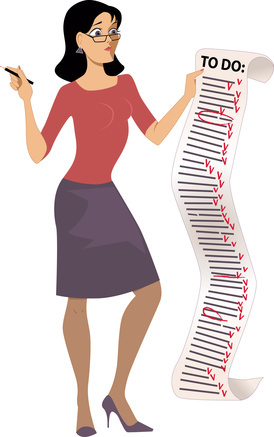
Is this your to-do list?
Work, exercise, family, study, community or voluntary work, hobbies, socialising – how do you fit it all in? Do you find yourself exhausted by the end of the week, berating yourself for all the things you didn’t have time to do? Overwhelmed when you look at your to-do list? Not achieving the goals you’ve set yourself because you have too many things on your plate?
If the answer is yes, you’re not alone – the overloaded plate is a common phenomenon of modern life. In fact, I’d go so far as to say it’s the norm. It’s almost a badge of honour to complain about being busy and not having enough time, as if somehow this is a measure of your importance in the world. The busier you are, the reasoning goes, the more you must be achieving.
This is a myth.
I’ve long been a fan of Leo Babauta of Zen Habits, who says in his blog post ‘When Your Plate is Too Full’ that we have to let go of the idea that we can do everything and do it well. Trying to do everything means you won’t succeed at any of them and you’ll do them all at sub-standard level.
He then goes on to say that in an ideal world we’d concentrate on doing one thing, give it our complete focus and become really expert at it. However in reality it’s hard to pare our life down to one thing, so he suggests two. He says, ‘I’ve found that you can do two things well and one thing really well. With two focuses, you won’t be as concentrated, won’t learn as deeply, but it’s doable. With three or four focuses, you won’t do anything well or learn anything deeply or serve anyone exceptionally.’
How do you simplify your life?
So he suggests figuring out what the two most important things in your life are and cut out the rest. You may have to be ruthless and say no to worthwhile projects, which is difficult, but preferable to being in a constant state of stress and exhaustion.
When I first read this post a few weeks ago, I was surprised . Focus on only one thing? Two at the most? It seemed very minimal and narrow. But the more I thought about it, the more I realised he’s right. How much more efficient and less stressful is it to put your energy into just one or two things than be torn in all directions? And how much more beneficial to concentrate on being an expert in one or two fields, instead of a jack of all trades and master of none?
Sometimes you have to say ‘no.’
I think one of the reasons that I resisted the idea at first is because I easily fall prey to the 'bright shiny object syndrome' – when I see something that looks interesting I want to pursue it. I’m interested in a number of fields of writing, so at various times I’ve contemplated taking up playwriting, screenwriting, travel writing, TV sitcom writing, white paper writing...the list goes on. And not only writing, I have a list of other things I’d like to try – studying philosophy, being a literacy tutor, any number of other voluntary and community activities.
However I already know from experience how time-consuming voluntary work can be, and how seductive the prospect of helping others and giving back to the community. But if it’s going to suck up too much of your time and energy and take your focus off something important you want to achieve, you have to say ‘no’ and try not to feel bad about it.
My new simplified life
Paring your life down to two areas of importance is challenging – and really forces you to look at your priorities. And sometimes the universe steps in to give you a hand. Health issues have resulted in my having to make the decision to leave my part-time job and resign from the committee of my local writers’ association – two aspects of my life which took up a lot of time and energy.
So now the way is open for me to focus solely on my path of being an author. And when you consider that an indie author not only writes his/her novels, but is also responsible for the publishing, marketing and promotion – that’s enough for any one person to take on and do well.
What about you?
Does this resonate with you? Or have you already taken stock and simplified your life? I’d love to hear your thoughts, so please comment below.
Share my post with your friends






May 22, 2015
Why I Love Travel Journals
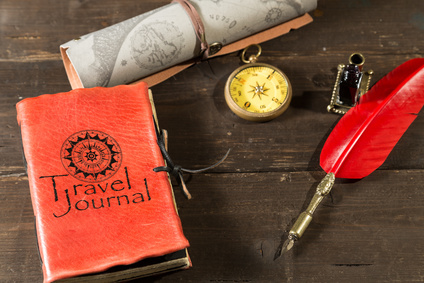
Travel journal
The world is a book and those who do not travel read only one page.
These are the words of St Augustine, a Christian theologian who died in 430 AD. And travel back then meant endless days under the beating sun or frozen sky on economy class donkeys, sustained by meagre portions of dried bread and warm wine, and no entertainment.
As someone who loves travel, I find it hard to understand people who have no desire to travel and are happy within the confines of home and hearth. Writers especially enjoy travel, as it gets us out of our writing comfort zone – being in a different environment with new things to see and do sharpens our senses, triggers our imagination and gets our creativity flowing.
Travel Journals
Which brings me to the subject of travel journals. I love them - moleskin, leather, girly pink, macho brown, covers adorned with a map of the world, cute cartoons or announcing ‘My Journey’, coyly intimating at inner journey revelations. I love the promise of crisp, new pages waiting for the first eager words of the excited traveller to tumble on to the page.
I see myself at the end of each day, sitting in my hotel room overlooking the glittering ocean or bustling city. The mere act of opening my travel journal kick-starts my brain into literary mode. Page after page flows with clever and thought-provoking reflections of the country I’m visiting, evocative descriptions of the landscape and pertinent observations of the inhabitants, which can then be extrapolated to humanity as a whole.
Fantasy vs Reality
That’s my travel fantasy. Here’s my travel reality – I flop on to the bed, exhausted after having tramped what seemed the equivalent of a religious pilgrimage in one day. I dig out my Spirax notebook with the plain cover that says ‘Notepad 8mmm Ruled 100 page’ and notice that my last entry was 3 days ago. Damn, now I have to do catch-up.
‘What was the name of that castle/mountain/lake we saw the day before yesterday?’ I ask my partner. We both 'um' and 'ah' – our heads are so stuffed full of new experiences that our mind’s computer bank hasn’t had a chance to file them yet. So I do the best I can, but by the time I get to today’s events, I’ve run out of sparkling metaphors and witty insights. So it’s more like a schoolgirl diary entry: This morning we had breakfast. We visited some castles, came back, had a nap, went out for dinner.
The worst part is, when I’ve reading back over it later, my handwriting is so atrocious I can scarcely read it. Consequently I now have a drawer full of Spirax notebooks filled with illegible scrawlings, their contents forever lost to posterity or the murky depths of my memory.
I’m about to leave for another holiday and I’m thinking this time I’ll keep an online journal. It doesn’t have the sensual, romantic appeal of a physical travel journal, but at least I’ll be able to read it.
Have you ever kept a travel journal? Any tips you’d like to share?
Share my post with your friends






April 24, 2015
Writers’ Rituals and Why They Work

I like writing surrounded by books
We writers are a weird bunch...
For a start, anyone who spends a lot of their time hanging out with imaginary people has to be just a wee bit crazy. And never more so than when it comes to writing rituals.
Now you’d think that sitting down to write would be easy. Just plonk your butt in the chair, fire up your computer and start. Nothing to it. But no. Like a dog that has to circle exactly 6 and a half times before it can lie down for a nap, we have our little rituals, without which our creative engines refuse to spark.
Famous writing rituals
Crime writer Michael Connelly has to work in a sealed room with blackout blinds (there’s someone who must be easily distracted) while drinking iced tea. Ernest Hemingway was way ahead of his time – the trend now is standing desks, but back in the 1950s, he got up at dawn, stood at his typewriter and slogged away until noon. It was the only time of day he was capable of standing, as he spent the rest of the day at the pub. Victor Hugo wrote in the nude, ensuring he couldn’t leave the house and even instructed his valet to hide his clothes.
The Greek statesman Demosthenes employed a similar principle, shaving one side of his head to ensure he would stay at home writing until the hair grew back. Did he never think of wearing a beanie? Truman Capote, calling himself a horizontal author, could not write unless he was lying down (needless to say, he wrote longhand), always with coffee and cigarettes, to be replaced by martinis as the day wore on.
Poet Frederick Schiller kept rotten apples in his desk drawer because he couldn’t write without their smell, which he claimed kept his imagination alert. Charles Dickens had to arrange the ornaments on his desk in a certain way before writing and French author Colette picked the fleas off one of her 12 cats - whether they each got a turn or whether it was the same excessively flea-ridden cat, it’s not clear.
My writing ritual
In comparison my writing ritual seems very bland, revolving mainly around where I write. I have always found it easier to write away from home – not only because there are fewer distractions, but also because the change in environment seems to spark my motivation and my creative energy. And even though I’m in my own little world when I'm writing I like to write in public spaces; I feel connected, yet separate. My local public library fits the bill perfectly and if I can find a seat near a window, I’m ecstatic. I’m sure that being surrounded by books acts as a subconscious motivator, with the hope that the sum total of the wisdom, creativity and literary skill in all those books will somehow, by a process of osmosis, find its way into my brain.
How do writing rituals work?
In a post called Why Weird Writing Rituals Work on the Women On Writing blog, Rosanne Bane, author of Around the Writer's Block – Using Brain Science to Solve Writers' Resistance, talks about the psychology of writers’ rituals, which make perfect neurological sense. When a group of neurons that process a certain behaviour are frequently activated at the same time as the neurons for another behaviour, those two groups of neurons will begin to act together simultaneously.
In other words, you’re training your brain and repetition is the key – if you run around the room squawking like a chicken before you start your writing and do it often enough, eventually your neurons will make the connection and your creativity will instantly fire up the minute you start squawking.
However, you need more than repetition to create a strong writing ritual. It’s not just an intellectual experience – you have to feel it as well (okay, forget the squawking chicken), and the more senses you employ the more effective it is. Bane describes how you can design your own writing ritual and suggests involving several sensory cues – for example, author Isabel Allende lights candles, surrounds herself with fresh flowers and incense and meditates as part of her daily ritual. Bane suggests making sure your cues are exclusive to your writing and not things that you do throughout the day, making it easier for your brain to make the connection between the ritual and writing.
What are the benefits of rituals?
Rituals help ease anxiety, something all writers experience in varying degrees, by soothing and calming the brain. When you’re not in the mood to write or feeling blocked, the writing ritual gives you a starting point, a way of easing into it and giving you the desire and confidence to keep going.
Bane says that when it comes to writing rituals, weird works. As Mark Twain said, ‘If you’d feel a little embarrassed doing your ritual in the presence of another person, you’re on the right track.’
Guess I’ll have to redesign my writing ritual – my present one is decidedly lacking in sensory cues and weirdness. I can see myself lounging at my desk in my comfy old velvet dressing gown embroidered with coffee stains, a packet of two-day-old prawn heads beside me (so much for your rotten apples, Schiller!) listening to a soundtrack of Herb Alpert and the Tijuana Brass and sipping a banana and beetroot smoothie.
And being thrown out of the library.
Do you have any writing rituals that you rely on to get you in the mood? Or if you’re not a writer, do you have another sort of ritual you’d like to share? Tell all in the comments below.
Share my post with your friends






March 29, 2015
What Genre Is That?

If you ask an author what genre of book they’re writing, they’ll readily tell you it’s a fantasy or crime or romantic comedy, or whatever it is. If they’re still deciding they might say, ‘It’s a zombie thriller with lots of comedy, a couple of vampires and a touch of romance.’
But ask a reader (who’s not a writer) what genre of novel they’re reading, and they may well look at you blankly, as if you’d asked them to calculate the square of the hypotenuse. Then they’ll launch into something like, ‘Well, it’s about this man who grew up in this very poor family and right from the beginning he’s got this secret but no-one knows what it is...’ (then ten minutes later) ‘ and at the end, you discover that the murderer was really his uncle and his wife was in on it the whole time. It’s really good - you should read it!’
The dictionary defines a genre as a style or category of art, music or literature. Authors need to classify their novels as a particular genre for marketing purposes, to help readers find the books that appeal to them and to help the booksellers target their advertising accordingly. In the ‘olden days’ when only print books existed, the bookstores needed to know the genre of the book so they’d know what shelf to place it on. Nowadays the shelf is just as likely to be a virtual shelf on an e-book site such as Amazon or Smashwords.
At this point I should clarify that I’m talking about fiction genres, although I’m sure that a lot of what I say would apply to non-fiction as well. Novels are like bread; when I was a kid, bread came in four types – brown or white, unsliced or sliced. There may have been different shapes, such as round or square, but they still had the same ingredients. Nowadays when you enter a bakery you’re overwhelmed with 37 different varieties of bread – and that’s just the sourdough! Same with novels – once upon a time there was adventure, romance, thriller, crime, science fiction, historical fiction. No doubt I’ve missed a couple, but the point is that the genres were simple and well-defined.
Now you just have to type a genre into Amazon’s search bar when you’re looking for books to see how many sub-genres there are. Under Romance, you have new adult and college romance, contemporary romance, women’s romance (is there such a thing as men’s romance?) and so on. Under Crime you have true crime, murder, biographies and memoirs of criminals, for starters. Admittedly, these genres are arbitrary genres defined by Amazon and I’ve yet to see a section in a physical bookstore called ‘biographies and memoirs of criminals.’ But this is the advantage of an online bookstore – because there are millions of books for sale, having a lot of very specific genres makes it easier for the reader to find the books that appeal to them.
To complicate matters, many novels published these days are cross-genre, which incorporate two or more genres – eg paranormal romance, science fiction thriller, romantic suspense etc. In traditional publishing times, submitting a cross-genre novel to a publisher always elicited the question of where you would place it in the bookstore, and because they didn’t know how to market a cross-genre novel, it usually meant rejection for the author, regardless of its quality. Today the question is irrelevant in this world of virtual bookstores – there’s endless room and myriad marketing strategies.
When you upload your book on to Amazon you can choose two categories, called browse categories, to help readers find your book, so it’s of paramount importance that you choose the right ones. But the range of categories to choose from is not as comprehensive as the range of books being written, and sometimes you end up shoehorning your book into a category that doesn’t do it justice.
While my first two books were easy to categorise – How Not To Commit Murder being a comedy crime (or in Amazon categories, Fiction – crime and humorous) and Perfect Sex a romantic comedy, (Fiction – romance and humorous) the novel I’m working on now will be more difficult. It’s a combination of crime, romance and humour. Probably more crime and romance then humour, so I think I’ll invent a new genre encompassing those two and call it cromance. Kind of like the cronut – a cross between a croissant and a donut. And if the novel happens to incorporate a close friendship between two men, it could be a bromance cromance.
Authors have to be aware, too, that readers have basic expectations that go along with each genre – for example, in crime novels there’s presumably some sort of crime that’s solved by the end, in romance novels the hero and heroine find themselves in each other’s arms in a happy ending and suspense novels keep you reading way past your bedtime with an edge-of-the seat story. Yet another reason to categorise your novel correctly – to avoid disappointing or alienating readers.
However, cross genre novels are rarely an exact balance of genres - like cross breed dogs, there is often one genre that overrides the other (s). For example, a romantic suspense may be more suspense than romance, with the romance consisting of smouldering glances as the hero and heroine flee from the enemy and lots of unresolved sexual tension as they lie side by side in the dungeon, bound and gagged. Not very satisfactory for romance buffs who need to know by the end of the book that the hero and heroine are headed for eternal bliss and a house with a white picket fence, but more than enough for the adrenalin addicts, for whom all that soppy stuff gets in the way of a gripping narrative. I consider comedy the overriding genre of both my novels and this is how I categorise them if I’m on a site which only gives me the choice of one genre.
To see an example of the range of contemporary genres, cross genres and sub genres, check out this list on Bubblecow.
http://bubblecow.com/book-genres-a-list-of-book-genres-every-writer-should-know
And for writers, here’s a good post on writing and marketing cross-genre novels.
http://www.writersdigest.com/online-editor/how-to-write-sell-the-cross-genre-novel
Have you wrestled with the question of deciding your novel’s genre? Or have you read a novel that didn’t live up to its genre? (for example, a romance that didn’t have a happy ending?)
Share my post with your friends






February 28, 2015
From Would-Be To Published Author – The Long And Winding Road
Every author’s journey is different. Some start with all guns blazing and have half a dozen novels under their belt by the time they’re 30. Others take up different careers, raise families and begin writing later in life when they have more time and freedom. For some, it’s a desire they’ve had buried deep inside for years; others discover a passion for writing they never knew they had.
I think my journey would best be described by the Beatles’ song The Long and Winding Road. Lots of detours and dead-ends. But to give myself credit, there have been some good straight stretches. And although each author’s journey is unique, there’s one thing we all have in common – no matter what obstacles we encounter, that shining passion deep within us won’t be quelled and we’ll always find a way.
Like most writers, my love of writing began in my childhood. I loved books from an early age (Enid Blyton was a favourite) and above is a photo of me in bed with my younger brother reading a Noddy book to him. (Or my four year old version of pretend reading. Note all the books strewn on the bed – a gluttony of early morning reading!) In primary and high school I excelled in English, won prizes in writing competitions and spent a lot of my spare time curled up in an armchair engrossed in a book. I think my childhood was pretty typical of many authors.
The only career I was interested in pursuing when I left school was journalism. Although there were university courses available, it was widely regarded that the best way to get employment as a journalist was to win a cadetship with a newspaper, which in my hometown of Brisbane was the Courier Mail. Each year there were hundreds of applications for a handful of positions. As well, my parents thought that due to my shy, introverted nature I wasn’t suited to journalism, where I’d be required to conduct interviews and investigations and other people-oriented tasks.
So I didn’t apply for a cadetship – why bother? With all that competition, I wouldn’t have a chance. And not having the belief in my abilities to pursue my chosen career regardless, I undertook a degree in the social sciences, where my creative writing abilities were put to use padding out boring essays on sociology theory at 3am on the day they were due.
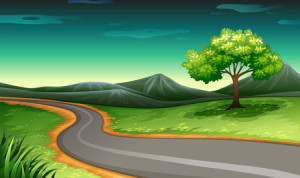
The long and winding road
During my twenties my writing ambitions lay dormant as I finished my degree and obtained employment in social welfare. In my late twenties I married and it wasn’t until I was 31, at home with a toddler and a baby and going crazy with the lack of mental stimulation, that my love of writing was rekindled. I enrolled in a correspondence course in freelance journalism, selling my much-loved 12 string guitar to pay for it. (A wise decision, as it turned out – as a guitarist, I make a great author).
If there was one major turning point in my life, this was it. I loved the course and when a couple of articles that I wrote as assignments were accepted by magazines, that sealed it. Not only was my latent belief in my ability to write validated, I could actually earn money from it as well!
Over the next fifteen years or so, I worked part-time as a freelance writer for newspapers and magazines while bringing up my family. One of my gigs was a weekly column in my local newspaper in which I chronicled the ups and downs of family life. I attracted a wide, enthusiastic following of family members, assorted ring-ins who were forced by those family members to read the columns, lovingly cut out and preserved in plastic sleeves, and two motley dogs. Needless to say my children, whose escapades were frequently the butt, I mean, topic of my columns were not amongst those followers.
Over the years I’d dabbled in short story writing and sent some stories away to magazines, with no luck. That was the extent of my creative writing until 2002. By this stage I was divorced with teenage children, and had dived into the uncharted (at that time) waters of internet dating. My experiences gave me an idea for a novel and 18 months later the final draft of my first novel Perfect Sex was completed. No-one was more surprised than I, as novel writing had never been on my agenda.
‘Never again,’ I groaned, but like a mother forgetting the pain of childbirth when planning her next child, I was soon engrossed in novel number two. So now I’m hooked and have been writing novels ever since, with occasional forays into short story writing for variety. To cut a long story short, I had no luck with getting Perfect Sex accepted for publication (the digital publishing revolution was yet to happen) so it languished in my virtual bottom drawer, until I hauled it out many years later and gave it a total makeover. Novel number two has taken the place of Perfect Sex in my bottom drawer and by 2013, when I was ready to publish my next novel, How Not To Commit Murder as well as Perfect Sex, indie publishing was in full swing.
As I outlined in my last post I’m now at work on a novella. Like many authors I also have a day job, but my aim is to become a full-time author. It has been a long and winding road, but I took the scenic route and got there in the end. And the advantage of coming to fiction later in life is that you have a wealth of life experience to draw on.
What song best describes your author’s journey? I’d love to hear about it – please share in the comments below.
The post From Would-Be To Published Author – The Long And Winding Road appeared first on Robin Storey.
From Would-Be to Published Author – The Long and Winding Road
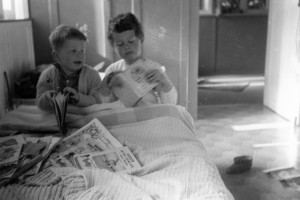
The budding author
Every author’s journey is different. Some start with all guns blazing and have half a dozen novels under their belt by the time they’re 30. Others take up different careers, raise families and begin writing later in life when they have more time and freedom. For some, it’s a desire they’ve had buried deep inside for years; others discover a passion for writing they never knew they had.
I think my journey would best be described by the Beatles' song The Long and Winding Road. Lots of detours and dead-ends. But to give myself credit, there have been some good straight stretches. And although each author’s journey is unique, there’s one thing we all have in common – no matter what obstacles we encounter, that shining passion deep within us won’t be quelled and we’ll always find a way.
Like most writers, my love of writing began in my childhood. I loved books from an early age (Enid Blyton was a favourite) and above is a photo of me in bed with my younger brother reading a Noddy book to him. (Or my four year old version of pretend reading. Note all the books strewn on the bed – a gluttony of early morning reading!) In primary and high school I excelled in English, won prizes in writing competitions and spent a lot of my spare time curled up in an armchair engrossed in a book. I think my childhood was pretty typical of many authors.
The only career I was interested in pursuing when I left school was journalism. Although there were university courses available, it was widely regarded that the best way to get employment as a journalist was to win a cadetship with a newspaper, which in my hometown of Brisbane was the Courier Mail. Each year there were hundreds of applications for a handful of positions. As well, my parents thought that due to my shy, introverted nature I wasn’t suited to journalism, where I’d be required to conduct interviews and investigations and other people-oriented tasks.
So I didn’t apply for a cadetship – why bother? With all that competition, I wouldn’t have a chance. And not having the belief in my abilities to pursue my chosen career regardless, I undertook a degree in the social sciences, where my creative writing abilities were put to use padding out boring essays on sociology theory at 3am on the day they were due.
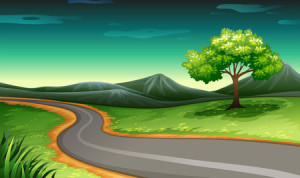
The long and winding road
During my twenties my writing ambitions lay dormant as I finished my degree and obtained employment in social welfare. In my late twenties I married and it wasn’t until I was 31, at home with a toddler and a baby and going crazy with the lack of mental stimulation, that my love of writing was rekindled. I enrolled in a correspondence course in freelance journalism, selling my much-loved 12 string guitar to pay for it. (A wise decision, as it turned out – as a guitarist, I make a great author).
If there was one major turning point in my life, this was it. I loved the course and when a couple of articles that I wrote as assignments were accepted by magazines, that sealed it. Not only was my latent belief in my ability to write validated, I could actually earn money from it as well!
Over the next fifteen years or so, I worked part-time as a freelance writer for newspapers and magazines while bringing up my family. One of my gigs was a weekly column in my local newspaper in which I chronicled the ups and downs of family life. I attracted a wide, enthusiastic following of family members, assorted ring-ins who were forced by those family members to read the columns, lovingly cut out and preserved in plastic sleeves, and two motley dogs. Needless to say my children, whose escapades were frequently the butt, I mean, topic of my columns were not amongst those followers.
Over the years I’d dabbled in short story writing and sent some stories away to magazines, with no luck. That was the extent of my creative writing until 2002. By this stage I was divorced with teenage children, and had dived into the uncharted (at that time) waters of internet dating. My experiences gave me an idea for a novel and 18 months later the final draft of my first novel Perfect Sex was completed. No-one was more surprised than I, as novel writing had never been on my agenda.
‘Never again,’ I groaned, but like a mother forgetting the pain of childbirth when planning her next child, I was soon engrossed in novel number two. So now I’m hooked and have been writing novels ever since, with occasional forays into short story writing for variety. To cut a long story short, I had no luck with getting Perfect Sex accepted for publication (the digital publishing revolution was yet to happen) so it languished in my virtual bottom drawer, until I hauled it out many years later and gave it a total makeover. Novel number two has taken the place of Perfect Sex in my bottom drawer and by 2013, when I was ready to publish my next novel, How Not To Commit Murder as well as Perfect Sex, indie publishing was in full swing.
As I outlined in my last post I’m now at work on a novella. Like many authors I also have a day job, but my aim is to become a full-time author. It has been a long and winding road, but I took the scenic route and got there in the end. And the advantage of coming to fiction later in life is that you have a wealth of life experience to draw on.
What song best describes your author’s journey? I’d love to hear about it – please share in the comments below.
Share my post with your friends






February 2, 2015
The Novella – Don’t Sell It Short
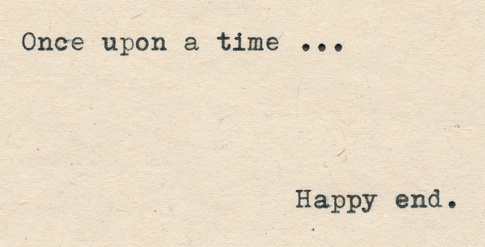
The Novella - short is sweet
I’m excited! I’ve just started on a new project – writing a novella. The novella, the novel’s little brother, has traditionally been overshadowed by its larger sibling, but is now coming into its own. And I want to be part of it! The fact that I only have to write around 40 000 words, 50 000 maximum, may also have a teeny bit to do with it. I wrote about my decision to write a novella in this post almost 2 years ago – doesn’t time fly when you’re procrastinating!
Prior to the popularity of e-books, the novella was rejected or outright ignored by publishers. Because of its brevity it wasn’t considered commercially viable to publish. The only people who published novellas were famous writers such as Ian McEwan (The Cement Garden, On Chesil Beach) Phillip Roth (The Dying Animal, Goodbye Colombus) and Stephen King (The Green Mile, The Shawshank Redemption), all of whom could turn their shopping list into a novella and it would sell. No wonder the poor novella has been in hiding with its tail between its legs, muttering, ‘So what if I’m short? What about Michael J Fox?’
This does seem strange, considering that many great writers have written at least one novella and many fiction classics are novellas, such as Animal Farm by George Orwell, Of Mice and Men by John Steinbeck, The Old Man and the Sea, by Ernest Hemingway, to name just a few. If you want to know more, there’s a list of the World’s Greatest Novellas on Goodreads - all 390 of them.
Nowadays with digital publishing the length of the book is immaterial with regard to cost – it can be 60 pages or 600. Indie authors can churn out two or three novellas in a year; the more books they publish, the greater their presence in the marketplace and consequently the more they sell. Some authors write novellas in between novels just for a change of pace. And with the busyness of modern life, many readers prefer shorter works of fiction they can read in a morning or an afternoon, or on the train to and from work.
So the novella is now gathering its own fan club, including Ian McEwan. In an article written for the New Yorker, he says,’I believe the novella is the perfect form of prose fiction. It is the beautiful daughter of a rambling, bloated, ill-shaven giant (but a giant who’s a genius on his best days).’
I like that metaphor – I think we’ve all struggled through a rambling, bloated giant of a novel, that would have lost none of its impact with a couple of hundred pages chopped out. And I rather like the idea, if anyone asks what I’m writing, of replying, ‘a beautiful daughter.’
Now you may be of the opinion that my decision to write a novella instead of a novel is due to nothing more than plain old-fashioned laziness. Ok, I admit that every time I sit down to write I have an overwhelming compulsion to go and curl up on the couch with a book and a block of chocolate. But most of the time, I manage to fight it off. (When I do succumb, it’s 'research').
And it’s a mistake to think that because a novella is shorter than a novel it’s easier to write. If anything, it’s harder. The novella still has to have a plot, albeit simpler than a novel, a main character who undergoes some sort of change and a resolution at the end. The art of being able to say a lot in a few words is essential – you can’t afford long descriptions, character analysis or pages of backstory. You have to get right to the point in every scene.
As Ian McEwan puts it, ‘the demands of economy push writers to polish their sentences to precision and clarity, to bring off their effects with unusual intensity, to remain focussed on the point of their creation and drive it forward with functional single-mindedness.’
Whew! Sounds intense. Where’s that chocolate?
Have you written a novella, or intend to write one? Or read one that you really enjoyed? Please share it with us in the comments below.
January 5, 2015
Back To The Future
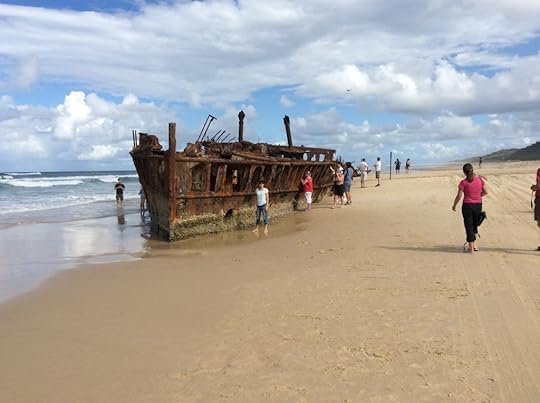
The Maheno Shipwreck on Fraser Island, where we holidayed this year
I swore I wasn’t even going to mention New Year resolutions in this blog post, but that was before I read a post by Annabel Candy, in her blog Get in the Hot Spot. Inspired by blogger Chris Guillebeau in his post ‘2014 Annual Review,’ Annabel also reviewed 2014, compiling a list of what went well and what didn’t go so well, both personal and professional. Then in her next blog she outlined her goals for 2015, bravely calling it her Grand Plan for 2015.
Both Annabel and Chris were very frank and upfront in their posts, particularly when describing what hadn’t worked as well as they’d hoped, and even though I don’t know either of them personally, I found both these posts very illuminating for two reasons:
It demonstrated that no matter how successful you are, no-one’s year is perfect. Everyone’s year is a combination of high and low points, and if you’re lucky, the highs outweigh the lows.
Secondly, this exercise added an extra dimension of warmth and humanity to two people whom I only know online. Both Annabel and Chris are successful and award winning bloggers with thousands of subscribers, yet after reading their posts, I felt as if I could sit down with either of them and have a friendly yarn over a cup of coffee.
I decided that compiling these lists would be a useful exercise to do myself, with one small variation. Instead of ‘things that didn’t go so well,’ I’ve named that list ‘things I could have improved.’ It’s not to deny that some things didn’t go well, it’s about mindset – by thinking in terms of improvement, I’m already in a more positive mindset of finding solutions and taking action. Obviously, this only applies to situations over which you have control. In the case of deaths of family or friends and other such circumstances, you cope as best you can, but fortunately none of those happened for me last year.
So here we go:
WHAT WENT WELL IN 2014
I confronted my lifelong fear of public speaking and undertook three author talks at local libraries, proving to myself that not only can I give a pretty reasonable presentation, but I can also sound as if I’ve been doing it all my life, even as I’m quaking in my high-heeled sandals!
I started a 10 minute a day meditation practice in the evenings after dinner, before I sit down to start writing. This helps me to clear my mind of the day’s events and become more focused on the task at hand. I have to confess that this routine went completely out the window over the Christmas break, but I’m now back into it again. Perhaps I may even increase it to 15 minutes this year!
My partner and I had a relaxing back to nature holiday after Easter on Fraser Island, off the Queensland Coast. For us, back to nature doesn’t mean sharing a tent with millions of creepy crawly insects, it’s staying in a comfy eco-resort with a swimming pool and cocktails to come home to after our canoeing and bushwalking. This was instead of our usual annual overseas holiday, as we’re saving up for a big one this year. (more about that later).
My daughter (and oldest child) became engaged to her long term boyfriend and they’ll be married in September. So I’ll be a mother in law. (Not sure I like that title, with all its negative connotations).
I found out the cause of my longstanding digestive problems – I was diagnosed as having a low functioning gallbladder. Although I was eating pretty well before, I have overhauled my diet and am now on the Paleo regime, with a couple of modifications. And guess what? No nausea, bloating or indigestion pains since I started it two months ago.
As well as our usual fitness regime of regular gym attendance, my partner and I bought hiking gear and started doing some long bushwalks in training for our big adventure this year – the Camino Frances pilgrimage across northern Spain.
Reading fiction in a variety of genres has been just as beneficial to me as a writer as attending workshops and seminars, and in keeping with this philosophy I read some great novels last year. Here are three of my favourites, with links to my reviews on book review site Goodreads. This House of Grief by Helen Garner, Bitter Wash Road by Gary Disher and Love in the Years of Lunacy by Mandy Sayer. And I’m also going to sneak in crime novella Ronne and Rita by Deborah Sheldon because even though I read it in December 2013, I didn’t write the review until January 2014. It deserves a special mention because this gripping and tautly written novella is one of the best I’ve read.
THINGS I COULD HAVE IMPROVED
After publishing my two novels How Not To Commit Murder and Perfect Sex in 2013, I planned to begin my next novel in 2014. But while I did a variety of other types of writing – marketing material for my partner’s business, editing for a couple of magazines and some short stories, I couldn’t seem to work up the inspiration or motivation to start a new novel.
Inconsistent book marketing. I had no marketing plan for my novels so it was done on very much an ad hoc basis, including my social media engagement. Often days would go by in between social media posts and weeks in between any particular marketing efforts. There were two main reasons for this:
I was over-committed. Besides the writing work mentioned above and my part-time job, I was (and still am) on the committee of my local writers' association, which has resulted in a monumental amount of work, and the combined effort of all these commitments meant I simply didn’t have the time or energy to commit to a marketing plan.
And secondly, being honest, I can’t totally blame being over-committed – I was also guilty of poor time management (eg getting sidetracked on the internet) and the scourge of all writers – procrastination.
Because I had so much on my plate, I ended up with burnout by the end of the year, when I simply didn’t have the inclination or energy to do anything at all.
Being mindful in my everyday life is something I’m always striving to improve. I’m a daydreamer by nature and consequently I’m often somewhere else in my head instead of being in the moment. ( I have to admit, though, that daydreaming is sometimes more enjoyable than being in the present – eg office meetings).
And now (drum roll) here are my goals for 2015, in the spirit of Annabel’s Grand Plan.
MY MAGNIFICENT PLAN.
Finish the first draft of my next work of fiction by the time we go to Spain in mid-September. Considering I’m aiming to write a novella (maximum 40 000 words), I’m hoping it will be doable, taking into account my part-time job and other commitments..
Complete the 795 kilometres of the Camino Frances pilgrimage. We will be in Spain for 2 months and plan to complete the trek in 6 weeks (that’s allowing for plenty of rest breaks – if we finish the trek sooner, all the better), then fly to the South of Spain for a well-earned holiday before returning home.
Practise more efficient time management and stick to the tasks in my weekly planner. It’s sitting on my desk right on front of me, but I’m pretty good at ignoring it when it suits me, or putting off today’s tasks until tomorrow. But no more! This year my weekly planner will get the attention it so rightfully deserves. Time management will be essential in completing goal number one.
Compile a book marketing plan and set aside a certain amount of time each week to carry it out. Even 30 minutes of consistent effort each week is better than long periods of time doing nothing.
Take myself on an artist date each week. This is a concept created by writer Julia Cameron in her bestselling book The Artist’s Way. It essentially means taking time each week to do something by yourself which will replenish your creative well and recharge your batteries. This will be vital if I am to prevent another end of year burnout.
Divest myself of my commitment to my local writers' organisation – for various reasons I’m unable to do that before the annual general meeting in August, but once I do, this will free up a lot more time.
Continue my health/fitness/meditation practices. Just because this is last on my list doesn’t meant it’s last in importance. It should really be top of the list, because if you’re not in good health and looking after your body, all the other goals are so much harder to achieve.
What about you? Have you made a Grand/Magnificent Plan for 2015? Or perhaps a Modest/Unremarkable Plan?
December 5, 2014
‘Tis The Season To Be Grumpy

My hat says it all
Around this time of year, I start to feel out of sorts – snapping at my partner for leaving his clothes on the floor (whereas for the rest of the year I just blithely ignore it), feeling so weary I long to fall into bed at 6pm, wanting the whole world to go away and stop making demands on me. My own behaviour is a mystery to me and I can’t work out why I’m feeling like this, then a few days into December, I remember – oh yeah, it’s end of year burnout again.
Interestingly, when I Googled ‘end of year burnout,’ most of the articles I found were about end of school year burnout for teachers. Some were about workplace burnout but I only found one article that acknowledged that burnout can affect people who aren’t teachers or employed in a high stress job.
Even Googling just ‘burnout’ produced mostly employment based articles, although there were a couple with a more holistic approach. Even Wikipedia defines it as a ‘psychological term that refers to long-term exhaustion and diminished interest in work.’
While I do have part-time employment which can be stressful at times, it is definitely not this alone which causes my burnout – it’s everything else as well. It’s the juggling act of employment, my creative writing, family and social/community commitments. I think it’s interesting that it always happens to me at the end of the year – it’s as if I’ve been able to keep all the balls in the air for most of the year, then because I can see the Christmas break and a well-earned rest coming up, I just drop them all in anticipation. It’s a similar feeling to when you’ve made the decision to quit your job or a relationship – you just want to get out then and there, and every minute you have to hang around makes you want to tear your hair out.
End of year burnout is obviously an understudied phenomenon and if those organisations that funded the research showing that toast always falls on the buttered side, or that listening to elevator music may help prevent the common cold would throw some dollars my way, I’d be happy to do it myself. Until that happens I’ll have to take a few educated guesses.
As burnout is often about long term stress, external or internal (and I admit some of mine is self-inflicted from setting goals, usually writing-related, that I’m not able to reach), the obvious answer to is de-stress more regularly during the year so it doesn’t build up. And I’ll be the first to admit, I fall down badly on that one.
As a creative introvert, I need regular time alone away from the computer to recharge my batteries, preferably out in nature like walking along the beach. But I rarely do it. Julia Cameron, in her inspirational book The Artist’s Way, calls it the artist date.
The idea is to take time out from your usual routine, at least once a week, to fill your creative well by going somewhere or doing something, by yourself, that interests you, stimulates you or relaxes you. Even though you might not be aware of it, your subconscious is chugging away quietly in the background, and on the odd occasion that I’ve taken myself on an artist date, I’ve not only felt refreshed and energised afterwards, but have come away with some new ideas or inspiration for my writing.
Another solution is to pare down my social/community commitments, which is easier said than done, as when I commit myself to something I don’t like to back out and let others down. But this is something I will definitely be working on next year. I think we writers, if we’re serious about our craft and want to have any sort of regular output, need to be selfish – after our employment (a necessity unless you’re John Grisham or the heir to a small, but wealthy European principality) and family, our writing should take top priority.
In fact, if we’re honest, sometimes our families take a back seat as well. Though hopefully not to the extent of James Joyce, who forced his wife and children to live in abject poverty for 17 years while he wrote Finnegan’s Wake, which was universally reviled and made him very little money. Could Mrs Joyce win the award for the most patient woman in history?
In his blog post When Your Plate is Too Full, Leo Babauta advises you to pare your life down to two main areas of focus. He says, ‘I’ve found that you can do two things well, and one thing really well. With two focuses, you won’t be as concentrated, won’t learn as deeply, but it’s doable. With three or four focuses, you won’t do anything well or learn anything deeply or serve anyone exceptionally.’
When I first read it, I thought, ‘Really? Only two things?’ I have four main focuses at present, but I know plenty of people who think it perfectly normal to have half a dozen. But the more I thought about Leo’s assertion, the more I realised he’s right. There’s no doubt that the pace of modern living is frenetic and we’re trying to jam-pack much more into our lives than any previous generation did. Maybe that’s why we as a society are so tired and stressed; we’re in permanent burnout.
I can feel a New Year resolution or two coming on, which at least brings a note of hope and optimism. But if one more sales assistant wearing reindeer antlers cheerily asks me,’ Have you started your Christmas shopping yet?’ I’ll strangle them with a piece of Christmas tinsel.
How about you? Have you experienced burnout? Any tips or suggestions?

